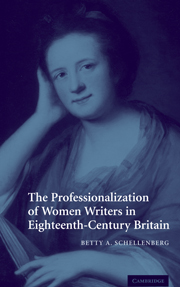Book contents
- Frontmatter
- Contents
- Acknowledgments
- A note on citations
- Introduction: “building on public approbation”
- 1 Frances Sheridan, John Home, and public virtue
- 2 The politicized pastoral of Frances Brooke
- 3 Sarah Scott, historian, in the republic of letters
- 4 The (female) literary careers of Sarah Fielding and Charlotte Lennox
- 5 Harmless mediocrity: Edward Kimber and the Minifie sisters
- 6 From propensity to profession in the early career of Frances Burney
- 7 Women writers and “the Great Forgetting”
- Coda
- Notes
- Bibliography
- Index
7 - Women writers and “the Great Forgetting”
Published online by Cambridge University Press: 12 November 2009
- Frontmatter
- Contents
- Acknowledgments
- A note on citations
- Introduction: “building on public approbation”
- 1 Frances Sheridan, John Home, and public virtue
- 2 The politicized pastoral of Frances Brooke
- 3 Sarah Scott, historian, in the republic of letters
- 4 The (female) literary careers of Sarah Fielding and Charlotte Lennox
- 5 Harmless mediocrity: Edward Kimber and the Minifie sisters
- 6 From propensity to profession in the early career of Frances Burney
- 7 Women writers and “the Great Forgetting”
- Coda
- Notes
- Bibliography
- Index
Summary
and if a rainy morning deprived [Catherine and Isabella] of other enjoyments, they were still resolute in meeting in defiance of wet and dirt, and shut themselves up, to read novels together. Yes, novels; – for I will not adopt that ungenerous and impolitic custom so common with novel writers, of degrading by their contemptuous censure the very performances, to the number of which they are themselves adding – joining with their greatest enemies in bestowing the harshest epithets on such works, and scarcely ever permitting them to be read by their own heroine, who, if she accidentally take up a novel, is sure to turn over its insipid pages with disgust. Alas! If the heroine of one novel be not patronized by the heroine of another, from whom can she expect protection and regard? I cannot approve of it. Let us leave it to the Reviewers to abuse such effusions of fancy at their leisure, and over every new novel to talk in threadbare strains of the trash with which the press now groans. Let us not desert one another; we are an injured body. … “And what are you reading, Miss———?” “Oh! it is only a novel!” replies the young lady; while she lays down her book with affected indifference, or momentary shame. – “It is only Cecilia, or Camilla, or Belinda;” or, in short, only some work in which the greatest powers of the mind are displayed, in which the most thorough knowledge of human nature, the happiest delineation of its varieties, the liveliest effusions of wit and humour, are conveyed to the world in the best chosen language.
(Jane Austen, Northanger Abbey, 1817)- Type
- Chapter
- Information
- Publisher: Cambridge University PressPrint publication year: 2005



